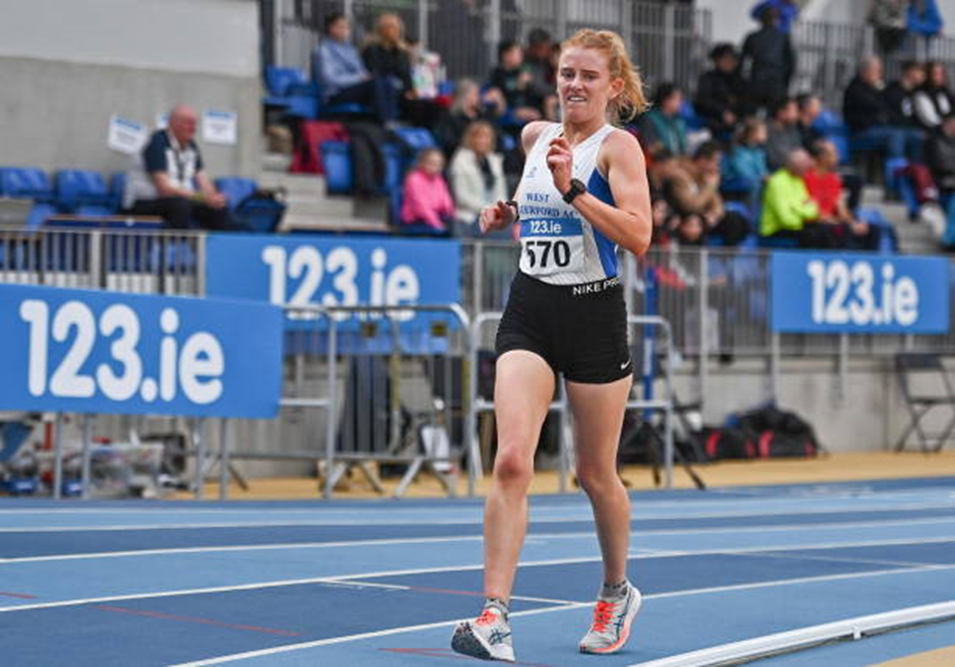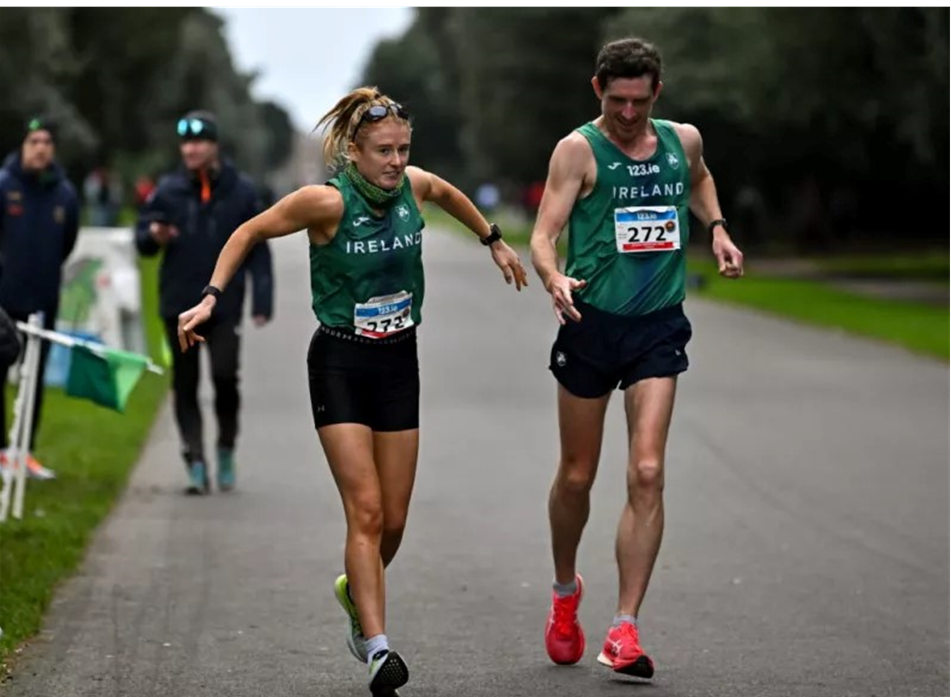From Pregnancy to Paris: The Journey of Kate Veale
- Niamh Fogarty

- Feb 6, 2024
- 5 min read
In our fourth blog of the high-performance athlete series, we are delighted to be joined by international Irish racewalker and 22-time national champion Kate Veale. In this edition, Kate reflects on her journey through pregnancy and the comeback to elite sport. Influenced by her own personal experiences, Kate shares some important advice for both athletes and those working alongside them on their return to sport.
Pictured above: Kate on her way to claiming team silver in the mixed relayed marathon race walk (Dublin, December 2023).
July 8th 2011 - a day to remember!
Standing tall in Lille Metropole stadium, Kate Veale basks in the glory as Amhrán na bhFiann rings out. At just eighteen years of age, the rising star from Dungarvan, Waterford secured her first global medal. Having won gold in the girls 5000m racewalk at the IAAF World Youth Championships, Kate’s future as an international Irish racewalker looked promising. Unfortunately, an ongoing hip injury put an early stop to this “upward trajectory”.
Kate battled with the mental toll of losing her identity as an elite athlete: “I became a person I didn’t even recognise”, but little did she know the great things that awaited her! Now 30 years old, and almost a decade after her pregnancy, Kate has her eyes firmly set on the Paris Olympics. How did she make it happen? Read more below.
Pictured above: Kate with her gold medal at the IAAF World Youth Championships (France, July 2011).
Tell me a little bit about your journey through pregnancy
Well, initially when I found out I was pregnant it was just such a shock. I didn’t get my withdrawal bleed (I was taking the pill) and I just thought that it was my body going back to its old ways of not having a period. I wasn’t educated enough on it, and I thought it was normal because I was training hard. So yeah, naturally enough it was a shock.
I was quite sick and the hip injury unfortunately came back. As I got bigger, I began to get pelvic issues and inflammation at my pubic bone. I wasn’t able to do the activity that I wanted to, which was hard. It was a strange time.
It was hard for me to be positive about the whole situation. I thought I had ruined my life and that I wasn’t going to be able to return to athletics. But looking back it was definitely a blessing in disguise. My daughter; Fíanna, she gave me a new lease of life and another purpose. I see things differently now because of her. I realised that life wasn’t all about athletics and that there was more to it. She has taught me a lot so I feel like it was meant to be.
Pictured above: Kate on her way to winning the national senior indoor women’s 3km racewalk (Abbotstown Dublin, January 2024).
What did you do to stay fit and healthy during your pregnancy?
I had done sports science and I knew how important it was to be as healthy as possible, both physically and mentally. So, for me it was a bit of jogging at the start and a bit on the bike. This progressed then to some non-weight bearing stuff like swimming and aqua jogging. I really found swimming amazing! I did a lot of walking too, but not racewalking!
Who helped you on your journey through pregnancy?
To be honest, I was really embarrassed and I kind of didn’t go to anyone professional about it for help or guidance. I was very lucky that I had so much support from my family and friends. I don’t know what I would have done without them! But, I think people should seek out the professionals in this area and get help from them too, and go to things like the pregnancy Pilates groups to meet other pregnant women that you can share your journey with. I think that would be kind of nice as a social thing as well.
Did you have any worries during your pregnancy? How did you overcome them?
I was not scared and I didn’t have any worries but I can understand how some people can, particularly around exercising. Everyone is different and what works for one won’t necessarily work for another. I think the human body is amazing and so resilient and that people should continue their exercise activities within reason. Now obviously there will be a stage where they need to take a step back, but if you’re keeping yourself monitored with a medical professional and you’re getting all your vitals checked and listening to your body, then continuing with exercise should be ok.
How did you get back into sport and exercise after your pregnancy?
I didn’t put too much pressure on myself. I started back doing a little bit with my club and doing the leagues and meeting up with a running group. I didn’t keep track of sessions, I just went out day by day based on how I felt. A year later then I did the Dublin marathon with my dad and I found my love for the sport again. I didn’t think I was going to compete internationally again because at that stage I was so long out of the sport. But I had this dream and I didn’t want to give up. I wanted to be an example for my daughter and have a story to tell her. So, in 2018 I started working with Robert Heffernan, got myself a proper programme, made some really good progress and said ok…let do this. Let’s go for the Olympics!
Looking back, is there anything you would have done differently?
Yes, a lot! But I suppose that goes for a lot of things in life. You can’t look back, you can only look forward. It’s all just about learning from it. I definitely would have reached out for more help, especially when I was experiencing hip pain and pelvic issues. I think now, I would have a better plan in place and have more belief in myself and tell myself that I am capable of coming back to a level that I wanted to be at.
What advice would you give to athlete-mothers returning to sport?
You are not alone: Don’t be afraid to lean on people for help when you need it.
Have a plan but also be flexible: Get into a routine that works for you and stick to it. Do what you feel is best for you and your child. You’ll learn this as you go along.
Have patience and don’t be too hard on yourself: It will take time to get back to the level you were once at, but believe in yourself and you will get there!
Don’t neglect the important things: Go for routine checks with physios and doctors. Make sure to prioritise your self-care too and things that make you feel good, especially sleep and nutrition.
For coaching staff working with athlete-mothers returning to sport, what advice would you give them?
Be very flexible with the training plan and don’t push for too much too soon just because they are an athlete. It’s about listening to the athlete and being understanding of the athlete’s situation and how they feel. Good communication is so important.






